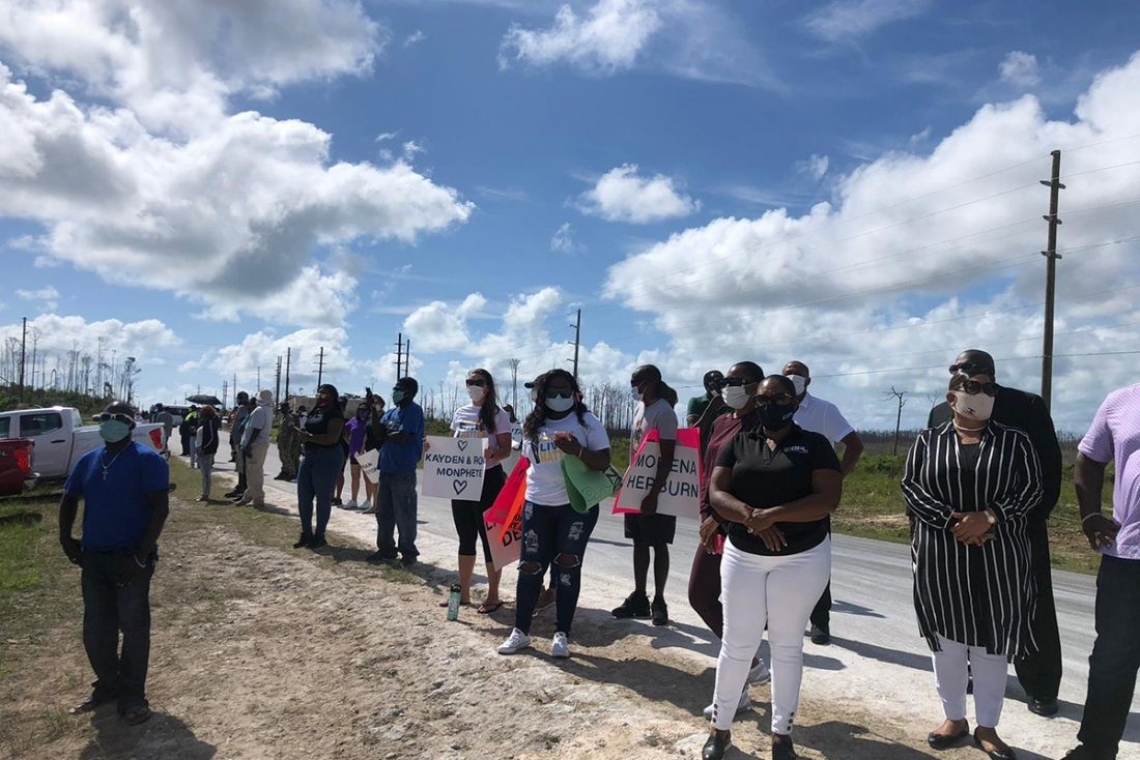Family members of 55 victims of Hurricane Dorian – who were laid to rest at a public cemetery in Central Pines, Abaco, on Friday morning – had to mourn behind barricades. Photo credit: Kyle Walkine.
ABACO, The Bahamas--On a hill within a public cemetery in Central Pines, Abaco, on Friday morning, sat a white coffin tagged with the number AB0027. It held the remains of one of the island’s residents who did not make it through the deadly Category 5 Hurricane Dorian last September and ultimately became one of 55 unidentified bodies buried by the government.
Ringing from down the hill behind barricades were the cries and screams of family members who never got the opportunity to identify remains of their loved ones, presumed deceased. They were informed that their relatives’ remains may be in one of the caskets, feet away from them.
“You got people’s family laying up there getting buried and they [are – Ed.] all the way down here behind barricades? Come on, man,” resident Evante Darville shouted from behind a barricade just after a heated exchange with a police officer, who tried to calm her down.
Just steps away, Anglican Archdeacon Keith Cartwright sought to explain to irate family members that the caskets were not empty, saying, “I watched yesterday [, Thursday, May 21,] as they took each body, one by one and placed them in the caskets. They are not empty. I can assure that.”
Louis Schneider has not seen or heard from his 66-year-old sister Constance Schneider since before Dorian struck and said he was told she was one of those being buried.
“I was denied the opportunity to give DNA three or four times,” he said.
“I thought it would have been useful to allow us to see a body and possibly give an ID. Nothing came to fruition. This here today [, Friday, May 22,] is the result. If you’re asking me what I think, this has been mismanaged from [when] the hurricane passed.”
As The Guardian spoke with him, one woman being propped up by her daughter, wailed in grief as she walked by.
She was one of the few allowed to walk up to the gravesite for a brief moment before they were escorted back behind the barricades.
While she was unable to respond in English, her daughter said, “Her husband – she lost her husband and he’s supposed to be up there, but we don’t know.”
Due to the government’s social distancing guidelines, only 25 members of the clergy and government officials were allowed to be at the service and 25 family members were allowed to sit some distance away under a tent.
On both ends of the S.C. Bootle Highway were police and Defence Force officers, some heavily armed.
Dozens of people holding placards stood in the road. On the placards were the names of those presumed dead, but whose remains have not been identified.
Lukenson Monphete was wearing a T-shirt with the images of his wife Rona Monphete and two-year-old son Kayden Monphete.
“They have me out here, but how could I see or recognise that’s my wife or that’s my son?” he asked.
“The casket may be there with nobody inside. Thirteen trips I made between Abaco and Nassau to try and find my wife’s body and bury her, but they won’t give it to me. They [government officials] spin me around like a yoyo, like I’m stupid. They didn’t tell me she’s up there, but I came to see and I can’t from down here.”
As emotions ran high down the hill, the service of remembrance went on, with religious leaders giving statements and performing the rite of burial for each of the victims.
With each casket, grave and body tagged, DNA samples remain in a lab outside the Bahamas. Samples from family members have also been taken.
If a match is made, family members would be able to find the body labelled with the number and would have the opportunity to exhume the remains and carry out a burial elsewhere.
The Disaster Reconstruction Authority (DRA) revealed it had been advised that due to the COVID-19 pandemic, laboratories had shifted priorities.
Prior to the burial, the remains were housed in a temporary morgue near the island’s clinic.
North Abaco Member of Parliament Darren Henfield said, in a time like this, difficult decisions must be made, but that they are done with sensitivity and dignity for the people lost and their families.
“We’ve come a long way in nine months, but we’ve still got a long way to go,” Henfield said.
“There’s still much more work to do. But I encourage everyone to pray for these families, pray for those who mourn today and pray for our island. Pray for our country.” ~ The Nassau Guardian ~







